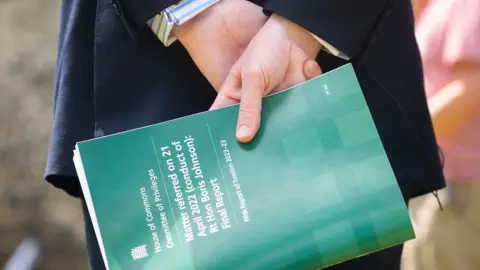Boris Johnson report: Key findings from the Partygate inquiry
 PA Media
PA MediaThe long-anticipated report by MPs into whether Boris Johnson misled Parliament over Covid lockdown parties in No 10 is finally out.
The report by the seven-member privileges committee followed a year-long investigation and runs to 106 pages.
The former prime minister stood down as an MP last week after receiving an advance copy, angrily accusing the committee of bias.
Here are the key findings.

He deliberately misled MPs
The main finding is that he deliberately misled the House of Commons by repeatedly telling it, after the Partygate scandal emerged, that Covid rules had been followed at all times in Downing Street.
He has already admitted MPs were misled by his original statements, but he says he believed them to be true at the time, and they were based on assurances he had received from officials.
However, the report found he had "personal knowledge" of breaches of the rules and guidance in No 10.
And it added he failed to proactively seek out "authoritative" assurances about compliance, which it said amounted to a "deliberate closing of his mind".
It concluded it was "highly unlikely" he had really believed the assurances he gave at the time, "still less that he could continue to believe them to this day".
Contempt of Parliament
The report therefore concluded he had committed a "contempt" of Parliament through his original reassurances, because they stopped MPs from carrying out their "essential task" of holding him to account.
They found that he had also committed a contempt by:
- deliberately misleading MPs on the Privileges Committee while they were investigating him
- referring to the committee's findings before they were published, in his resignation statement last week
- "impugning the committee" in his criticism of it, and being complicit in a "campaign of abuse" against its members
The committee found that the contempt was "all the more serious" because he was the most senior member of the government.
Key evidence
One key bit of evidence came from Martin Reynolds, his former principal private secretary, a civil servant.
He told the inquiry that, while preparing for a session of Prime Minister's Questions in December 2021, he had questioned whether it was "realistic" for Mr Johnson to say rules had always been followed.
Mr Johnson also said he'd been given assurances by his media advisers that rules were followed.
But the committee said this advice, given in response to press stories, should not have been used to make broad statements about rules being followed at all times.
The report said he should have obtained an "authoritative assessment" before saying this, for example by consulting government lawyers.
The committee also published new evidence, including a statement from an unnamed No 10 official that there was a "wider culture of not adhering to any rules" in the building.
The official added that birthday parties, leaving parties and end of week gatherings "all continued as normal" during the pandemic.
Punishment
The committee said before Mr Johnson announced he was quitting as an MP, it had wanted to recommend suspending him from for more than 10 days.
This would have meant he would potentially have faced a by-election in his Uxbridge and South Ruislip constituency.
The report also revealed two of the committee's MPs, the SNP's Allan Dorans and Labour's Yvonne Fovargue, wanted to expel him from the Commons - but were outvoted.
Expulsion is extremely rare in Parliament's history, having occurred only three times in the last hundred years or so.
But suspending him is no longer an option, given that he's already stood down as an MP in his blistering resignation statement last week.
However, the report says that now, given what he's said about the committee, they would have recommended a ban of 90 days - an extremely long ban by the standards of recent years.
And it says he should not get a parliamentary pass, which former MPs would normally be able to apply for.
Perhaps the greatest punishment in the report, ultimately, will be the damage it does to his reputation among Conservative MPs - and what it means for his prospects of any future political comeback.
